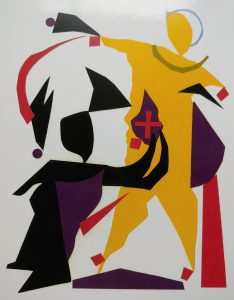Stations of the Resurrection
VI – In the Upper Room with Thomas
A Psalm Paraphrase
Lection
1 Peter 1:3–9
3Blessed be the God and Father of our Lord Jesus Christ! According to his great mercy, he has caused us to be born again to a living hope through the resurrection of Jesus Christ from the dead, 4to an inheritance that is imperishable, undefiled, and unfading, kept in heaven for you, 5who by God’s power are being guarded through faith for a salvation ready to be revealed in the last time. 6In this you rejoice, though now for a little while, if necessary, you have been grieved by various trials, 7so that the tested genuineness of your faith—more precious than gold that perishes though it is tested by fire—may be found to result in praise and glory and honor at the revelation of Jesus Christ. 8Though you have not seen him, you love him. Though you do not now see him, you believe in him and rejoice with joy that is inexpressible and filled with glory, 9obtaining the outcome of your faith, the salvation of your souls.
P: This is the word of the Lord.
C: Thanks be to God.
John 20:24–31
24Now Thomas, one of the Twelve, called the Twin, was not with them when Jesus came. 25So the other disciples told him, “We have seen the Lord.” But he said to them, “Unless I see in his hands the mark of the nails, and place my finger into the mark of the nails, and place my hand into his side, I will never believe.”
26Eight days later, his disciples were inside again, and Thomas was with them. Although the doors were locked, Jesus came and stood among them and said, “Peace be with you.” 27Then he said to Thomas, “Put your finger here, and see my hands; and put out your hand, and place it in my side. Do not disbelieve, but believe.” 28Thomas answered him, “My Lord and my God!” 29Jesus said to him, “Have you believed because you have seen me? Blessed are those who have not seen and yet have believed.”
30Now Jesus did many other signs in the presence of the disciples, which are not written in this book; 31but these are written so that you may believe that Jesus is the Christ, the Son of God, and that by believing you may have life in his name.
P: This is the word of the Lord.
C: Thanks be to God.
Artwork and Discussion
John 20:24-29
Thomas the Twin was dubious about the risen Christ. For him, seeing is believing, and Thomas was a holdout. While he is often remembered for doubting the word about the risen Jesus, he was also capable of courage. When Jesus received the message of Lazarus’ death, he resolved to return to Judea to “wake him up”—and this decision overrode the disciples’ caution. There were plots on Jesus’ life. Thomas simply said, “Let us also go that we may die with him” (John 11:16).
While Thomas, like Martha, can believe in a general resurrection, for him the question was whether by dying as a mortal, Jesus could be, in fact, the divine Son of God. Do gods change? Suffering and death entail drastic changes and gods by definition are apathetic (unchangeable, non-passioned Beings). Isn’t death and the role of Son of God mutually exclusive?
Thomas is overcome by the evidence of Jesus standing in front of him, inviting a probe of his wounded side. His response, “My Lord and my God!” affirms Jesus’ divinity with a typical Jewish phrase (“my Yahweh, my Elohim”—the holy name, Yahweh, was unspoken, with “Lord” as a substitute: the “LORD God” in English texts indicates that in the Hebrew text the tetragrammaton, YHWH, is used). Thomas’ confession would become very meaningful to persecuted Christians when Roman emperors, Nero and later Domitian, chose the title, “Lord and God” (Latin: ‘dominus et deus’).
Jesus adds a beatitude for the Church of later generations: “Blessed are those who have not seen and have yet believed!”
Meditation / A Responsive Reading
The Prayer
